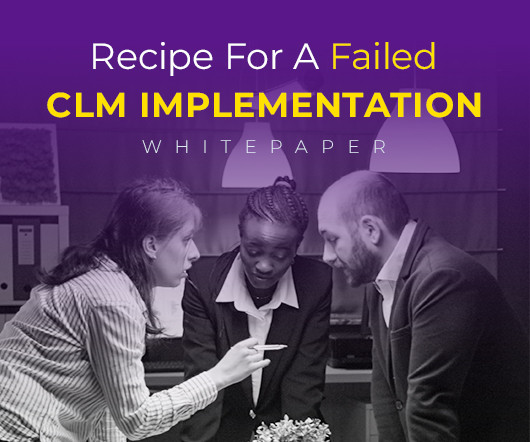The Reason The Best Paralegals Are Methodical
The Paralegal Society
APRIL 20, 2016
By: Jamie Collins “Stress is the negative whirlwind of emotions that gets imposed on top of our stimulation and engagement.

The Paralegal Society
APRIL 20, 2016
By: Jamie Collins “Stress is the negative whirlwind of emotions that gets imposed on top of our stimulation and engagement.

DigitalParalegalServices
APRIL 4, 2016
Attorneys: Why eDiscovery Support Staff Is Critical. By: Angela Masciulli, ACP. Legal technology and eDiscovery is here to stay, but you know that right? As an attorney, you have probably read numerous articles, case law, and attended CLEs on eDiscovery. Maybe you have even demoed out a few eDiscovery applications and integrated them into your practice.
This site is protected by reCAPTCHA and the Google Privacy Policy and Terms of Service apply.

Broadcast Law Blog
APRIL 7, 2016
This article was written by two new contributors to the Blog, trademark attorneys Radhika “Ronnie” Raju and Kelly Donohue. According to the Patent and Trademark Office (PTO), the answer is “No,” as the PTO recently refused an application by the producer of the podcast to register the mark SERIAL for an ongoing audio program, finding that the mark was too “descriptive” to be registered (the decision and related documents can be found here – note it is a relatively big file).

LawActually
APRIL 25, 2016
In the background at work today – one of the perks of having duel screens and nobody sitting behind me - I’ve been following the Guardian’s live commentary on the unfolding BHS administration crisis. Following and grimacing, that is. Here are some excerpts. [The Guardian’s] financial editor Nils Pratley has some stern words of advice for Dominic Chappell, boss of BHS owner Retail Acquisitions […] Nils notes how Chappell is “crassly missing the required tone” when he writes in an email to staff:

Advertisement
A Synergistic Approach to eDiscovery In the space of eDiscovery, the convergence of document summarization, sentiment analysis, and chatbots represents a significant change in how legal professionals navigate and manage electronic information. These technologies not only expedite the review process but also empower legal teams with deeper insights into the emotional context and key information within electronic documents.

Broadcast Law Blog
APRIL 29, 2016
May is one of those off months in which there are not the kind of routine filings that pop up in most other months – no EEO Public File Reports, no quarterly issues programs lists or children’s television reports, no Biennial Ownership Reports for noncommercial stations (which will soon disappear anyway when noncommercial stations transition to the same biennial report deadline as commercial broadcasters – see our articles here and here ).
Paralegal Brief brings together the best content for paralegals and legal professionals from the widest variety of industry thought leaders

Broadcast Law Blog
APRIL 28, 2016
There were several recent FCC decisions on application processing matters worthy of note. One deals with the processing of commercial applications for FM stations or FM translators that are involved in an auction to resolve disputes, the others with the processing of noncommercial applications (in this case for LPFM stations). None break new ground – but instead they reinforce earlier decisions that some who have been around the broadcast industry had found surprising, so these decisions are wor

Broadcast Law Blog
APRIL 27, 2016
The FCC has released a Public Notice , as promised by FCC Chairman Wheeler at last week’s NAB convention, asking for public comment on the proposal filed by the National Association of Broadcasters, the Consumer Technology Association and others requesting that the Commission approve ATSC 3.0, the next transmission system for over-the-air television broadcasting.

Broadcast Law Blog
APRIL 26, 2016
At the NAB Convention last week, FCC Chairman Tom Wheeler discussed the timing of the incentive auction and how some of the remaining issues may soon be resolved. One subject of talk in a number of NAB sessions, as well as in the trade publications, has been how the repacking of broadcast television spectrum will proceed after the auction. Even FM broadcasters noted the potential for disruption of their operations as the repacking may affect shared users of broadcast towers , and given that hund

Broadcast Law Blog
APRIL 25, 2016
The “ performing rights organizations ” – ASCAP, BMI and SESAC – don’t get as much attention in these pages as do the royalties paid to SoundExchange for the use of “sound recordings.” The PROs collect for the public performance of the “musical work” or the musical composition – the words and music of a song. These royalties are paid anywhere that music is performed in the US – including by radio and TV stations, by retail establishments and by digital music users.

Advertisement
Selecting and implementing CLM technology can be daunting, leading to underutilization or abandonment. Factors like provider differentiation, inadequate planning, and lack of user training contribute to these failures. Recognizing these pitfalls is crucial for successful adoption, ensuring organizations harness the full potential of CLM for streamlined contract management.

LawActually
APRIL 19, 2016
Or at least spoke in an anachronistic manner. Personally, I think the police are worse, what with their painfully guarded style of thinking and speaking and sometimes bizarrely formal vocab and phrases. I’m sure we’ve all seen news interviews with investigating officers which border on farcical for the terminology they insist on using. No doubt that ‘police speak’ is a required element of the curriculum at Hendon for all would-be police officers.

Broadcast Law Blog
APRIL 18, 2016
Can e xpenses incurred by a TV station now in making moves to prepare for the post-incentive auction repacking of the TV spectrum be reimbursed if that station in fact is forced to move after the auction? In a clarification “Declaratory Ruling” released on Monday, the FCC said that they can – in an aim designed to expedite the post-transition repacking of the broadcast spectrum.

LawActually
APRIL 15, 2016
Guest Post So you’ve joined the ranks of thousands of other motorists who’ve been charged with drink driving. Although you may think it’s the end of your hopes and dreams for the future, all is not lost. By hiring the kind of solicitor who knows their law on this subject, it could not only save you from a disqualification but also time, money and stress.

Broadcast Law Blog
APRIL 15, 2016
Can the name of a state be trademarked so that no one else can use it in a particular line of business? Last week, in connection with the denial of the trademark application filed by the producers of the podcast SERIAL, we wrote about the difficulty of trademarking brands that are descriptive of the product that they promote. What could be more descriptive than the name of a place where the product originates?

Advertisement
CLM tools have always strived to push contract management into the digital age for almost 30 years. But the complexities of digitising a legal document are numerous. The current scenarios in business development have shown that having a fully automated CLM has become a mandate for every law firm and in-house legal department. To determine if you need a CLM system, it's essential to clearly identify the on-ground business challenges you aim to solve.

Broadcast Law Blog
APRIL 14, 2016
Pre-1972 sound recordings are back in the news. Yesterday, the US Court of Appeals for the Second Circuit decided to defer its consideration of an appeal of a District Court’s decision that NY law included a public performance right for pre-1972 sound recordings. The Court deferred its decision until it can get a definitive answer as to whether or not such a right exists under NY state law.

Broadcast Law Blog
APRIL 13, 2016
Pirate radio is still a problem. While pirate radio was much in the news a decade ago, and was even glamorized in movies, the popular perception may be that it has disappeared. In fact, particularly in major urban areas, it is still a major issue – causing interference to licensed broadcast stations and even, at times, to non-broadcast communications facilities.

LawActually
APRIL 12, 2016
Believe it or not – and I, for one, certainly don’t believe it – legal blogging is experiencing a resurgence. A resurgence? In legal blogs? Really? Where’s this taking place, then? ‘Cause it’s certainly not on the web. Still, Nick Holmes pretty much nails what I think is largely behind the downfall of legal blogging (or blawging as it was once known): What has changed fundamentally is the nature of the ensuing conversation which formerly took place in the comments sections on blogs.

Broadcast Law Blog
APRIL 12, 2016
Both the popular and media trade press has been full of reports in the last few weeks about musicians and other artists petitioning the Copyright Office to hold YouTube and other online services liable for infringement when the artists’ copyrighted material appears on the service (see, e.g. the articles here and here ). The complaints allege that these services are slow to pull infringing content and, even when that content is pulled from a website, it reappears soon thereafter, being re-posted

Advertisement
Short article looking at the new CCP 2016.

Broadcast Law Blog
APRIL 5, 2016
Last week was a busy one for the FCC, with decisions or proposals on a number of issues that can affect broadcasters, including changes to the EAS rules and proposals for the expansion of video description – the requirements that TV stations carry a certain amount of programming that is accompanied by audio descriptions to explain the visual action to TV station viewers who are blind or otherwise visually impaired.

Broadcast Law Blog
APRIL 4, 2016
The changes in the FCC’s rules for Biennial Ownership Reports on FCC Form 323 were today published in the Federal Register. That publication starts the 30 day clock for petitions for reconsideration or requests for appeal of that decision. We summarized the changes in the requirements here – changes that include putting noncommercial stations on the same schedule as commercial stations (filing on December 1 of odd-numbered years) and requiring that all licensees obtain, for every person or entit

Broadcast Law Blog
APRIL 17, 2016
On the eve of this year’s NAB Show in Las Vegas, the FCC has been asked to approve the next generation of TV transmission – ATSC 3.0. A broad coalition – broadcasters through the NAB and APTS (the public television association), technology manufacturers (through CTA – the Consumer Technology Association formerly the Consumer Electronics Association), emergency communications advocates (through the AWARN Alliance, which includes broadcasters) and ATSC (the TV technology standards association) ha

LawActually
APRIL 30, 2016
I’m not a runner. I can’t think of anything worse than deliberately choosing to go out to pound down a pavement in my running gear, crippled with a stitch, sweaty of groin, moist of brow, with that hot coppery sensation of burning lungs struggling against cold air. (Ah – the memories of P.E. at school. What a joy it is to have escaped that misery.) However, I don’t live a million miles away from where this Parkrun malarkey has been taking place.

Advertiser: Regal Court Reporting
In the world of legal proceedings, the choice between a certified stenographer and digital "reporting" holds significant implications. Certified stenographers go through rigorous training and testing and stand as the gold standard for accuracy in capturing every word. Their expertise ensures a reliable record, a crucial foundation for legal cases.

Broadcast Law Blog
APRIL 8, 2016
A Washington Post article published this weekend was titled “ Is there anything you can’t say on TV anymore? It’s complicated.” And, it really is. The Post article presents a very good overview on the status of the FCC’s indecency rules. What will happen with those rules has been a matter of conjecture for several years, ever since the Supreme Court threw out the fines that the FCC had imposed for fleeting expletives that had slipped out in the Golden Globes and other awards programs, a case tha
Let's personalize your content